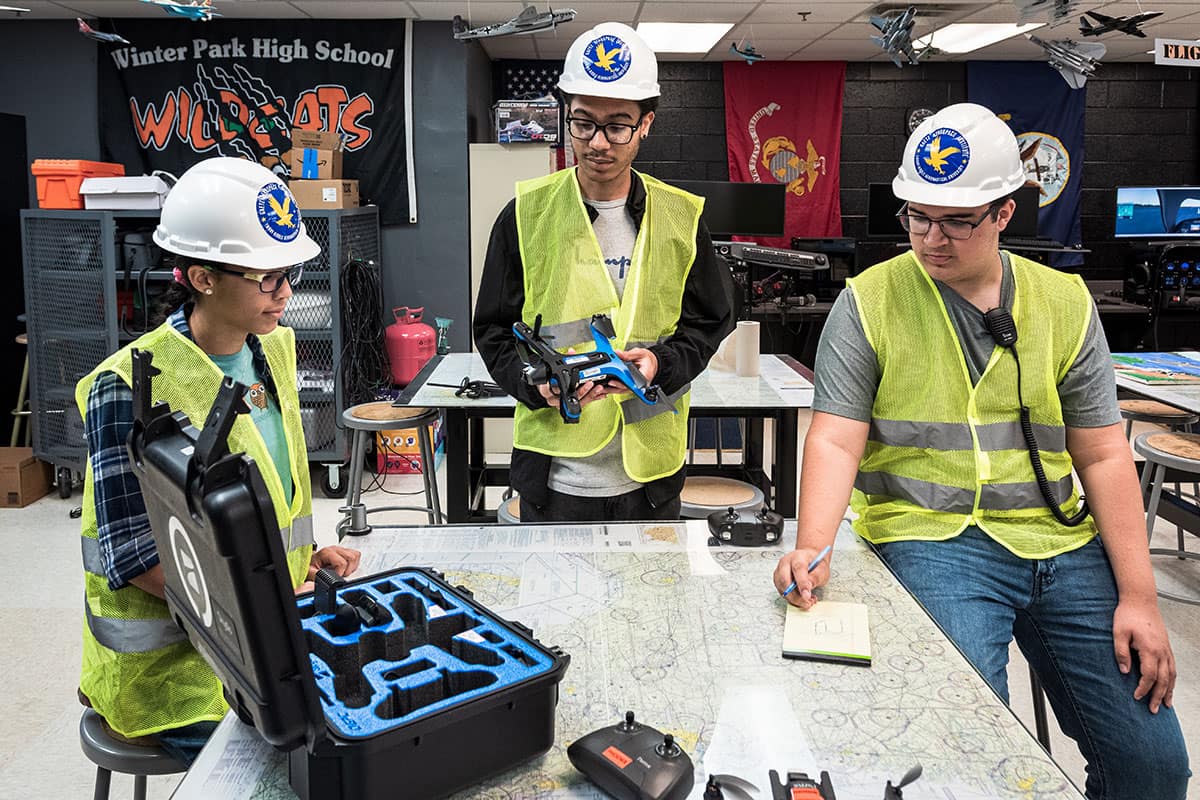Aviation Week Op-Ed: Gaetz Aerospace Career Academy Provides Clear Path to Aviation and Aerospace Careers, Embry-Riddle President Writes

In his latest Aviation Week essay, Embry-Riddle Aeronautical University President P. Barry Butler, Ph.D., highlights how Embry-Riddle’s Gaetz Aerospace Career Academy can serve as a template for reaching young people and helping guide them into the aviation and aerospace industries. Through the Hunt Library, the Eagle community can log on to ERNIE to freely access the op-ed. Alternatively, subscribers to Aviation Week can log on to the publication’s website to access the essay, which is also provided below.
Young People Need a Lift Into Aviation and Aerospace Careers
Isabella Gutierrez says she was always “interested in planes.” But she had no prior experience in aviation before attending Winter Park High School, a school near Orlando, Florida, that is part of the Gaetz Aerospace Career Academy.
Now 16 years old and a sophomore, Gutierrez can point to a screen showing a sectional aeronautical chart of the Orlando area, identifying airspaces and describing flight and altitude restrictions. Gutierrez has already completed college-level classes in aeronautical science and uncrewed aircraft systems (UAS) and earned an industry-recognized certification in drone safety. She aspires to study aeronautical engineering and become a pilot.
The aviation and aerospace industries must make it a top priority to find more young people like Gutierrez. Last year, Boeing’s Pilot and Technician Outlook report estimated that global aviation will require 674,000 new pilots and 716,000 new maintenance technicians over the next two decades. According to the U.S. Bureau of Labor Statistics, about 4,200 aerospace engineers will need to be hired annually over the next 10 years.
The sole mission of Embry-Riddle Aeronautical University’s Gaetz Aerospace Career Academy is to inspire and attract middle- and high-school students to aviation and aerospace. A collaborative effort between Embry-Riddle and the state of Florida, it can serve as a template for reaching young people and helping guide them into our industry.
The academy — formerly known as the Gaetz Aerospace Institute — first connects with students through courses under the rubric of SMART, an acronym for Space, Manufacturing, Aviation, Robotics and Technology. Embedded into the courses are hands-on activities such as building underwater remotely operated robotic vehicles and drone flying competitions.
Interested students can then segue into the Gaetz Aerospace Career Academy’s dual-enrollment courses. In nearly 100 Florida high schools, these university-level courses are taught by credentialed teachers. Teacher training programs equip these educators with industry-standard expertise and innovative instructional strategies, ensuring that the courses reflect Embry-Riddle’s rigorous curriculum.
Course offerings include everything from the fundamentals of aviation, pilot operations, aviation maintenance and engineering, to uncrewed aircraft systems, human factors and space flight.
Students can even begin their pilot training while still in high school. The Private Pilot Operations course serves as ground school to prepare them for the FAA’s private pilot knowledge test. Many are also earning their Part 107 Remote Pilot certificates, which allow them to fly drones for commercial use.
The program’s effectiveness is evident in the number of its students who have gone on to enroll at Embry-Riddle: 847 undergraduates, 68 graduate students and four doctoral candidates since 2014.
Among respondents to a survey of Embry-Riddle’s 2019-20 class who began in the academy’s dual-enrollment courses, 100% were employed or continuing their education four years after graduation. Though it remains Florida-centered, the program has been expanding, with other sources of funding, to include 11 high schools in five other states: Illinois, New Jersey, Ohio, Colorado and South Carolina.
“We’re not just teaching aerospace skills, we’re igniting a lifelong passion,” explains Dr. Colleen Conklin, executive director of the Gaetz Aerospace Career Academy. “When young minds see how their ideas can take flight, we build more than a pipeline, we build the innovators and explorers who will carry our industry into the next century.”
Another benefit of the Gaetz Aerospace Career Academy is that it generates its own role models and ambassadors.
For Jacob Schwarm, a former Gaetz student who earned his Aeronautical Science degree from Embry-Riddle in 2021, the academy provided his first look into the world of aviation, including a memorable tour of JetBlue University in Orlando that left him convinced he wanted to be a pilot, although there were none in his family.
“My grandpa sold cars for 45 years. My mom and dad were teachers,” he says. “I think Gaetz is really what sold a lot of us on being in aviation.”
Schwarm is now a chief pilot with Mapware, an advanced geospatial intelligence company that gathers data through crewed and UAS. And he has since returned to his high school in St. Augustine, Florida, to speak to students about his experiences, helping inspire the next urgently needed cohort of aviation talent.
P. Barry Butler is president of Embry-Riddle Aeronautical University.
